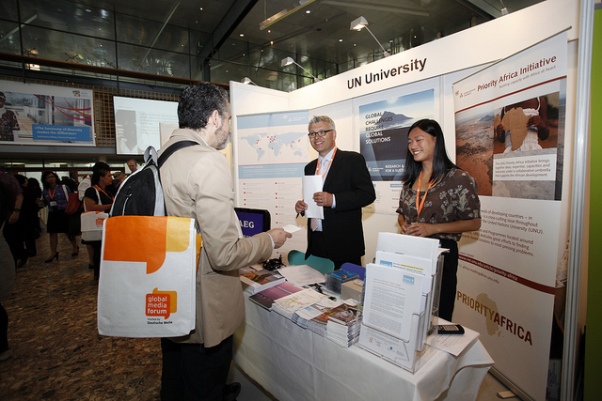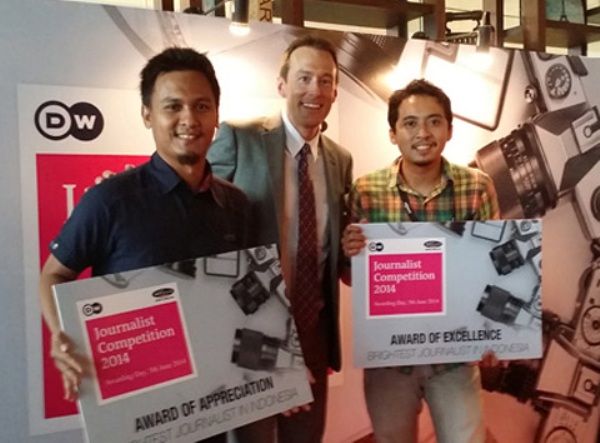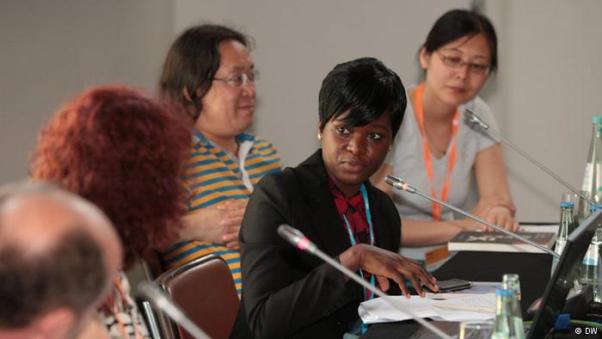Using mobile technology in creative ways
 Digital and mobile technology is changing the world but some effects may be less obvious than what you see every day. A selection of talks and presentations from niche companies to big telecoms will cover some innovative trends and techniques at the 2014 Global Media Forum.
Digital and mobile technology is changing the world but some effects may be less obvious than what you see every day. A selection of talks and presentations from niche companies to big telecoms will cover some innovative trends and techniques at the 2014 Global Media Forum.
A presentation hosted by big-data experts, Flowminder, and the United Nations University – Institute for Environment and Human Security (UNU-EHS), focuses on how collecting and analyzing mobile data can be used in determining the extent and real effects of mass displacement following major environmental catastrophes. The presentation titled Big data, big insights: Mapping climate-induced displacement with mobile data, takes a unique look at how mobile data can be used to get accurate assessments of where people go, if they return and if proper aid is being provided to affected areas. The group will present the results of data analysis from five million anonymous cell phone users in the wake of Cyclone Mahasen that struck Bangladesh in May 2013.
Also exploring the effects of mobile technology on society and social development is a discussion hosted by the Vodafone Institute for Society and Communication titled, M-powering society: How mobile technology is changing society. The panel will discuss how mobile technology is being applied to create mobile health, mobile education and mobile government, emphasizing what makes mobile solutions more effective and the positive impact of mobile technology in developing areas of the world.
A talk hosted by the Grimme Institut will cover how digital technology is changing the way people express themselves and share narratives. The session titled See YOU in the future – new ways of digital storytelling, looks at how digital technology has given everyone a voice and has broken down social and cultural barriers. The discussion will explore future tools and platforms and introduce how digital stories are used in different areas of society.
In the final installment next week before the Global Media Forum begins, we will highlight some events covering the main issue at the conference – how digital technology is enabling increased participation in media and governance.
Protecting the fundamental rights of information and expression
The values of liberal democracy are firmly rooted in freedom of expression and information. These vital pillars of society however need to be protected as technology shifts the channels of information and new methods of control are applied. The current state of these fundamental rights in the digital world is on the agenda at the 2014 Global Media Forum.
The international human rights organization, Amnesty International, in cooperation with the German Institute for Human Rights, will cover these issues in a talk titled An ice age for privacy? The rights to free speech, information and privacy versus mass surveillance. The discussion will emphasize how privacy of information is essential to preserving freedom of expression by looking at examples such as Edward Snowden blowing the whistle on the NSA’s digital surveillance and exposing institutional violations of privacy. The talk also explores how to protect the media and whistleblowers and how much privacy must be exchanged in the name of security.
Reporters Without Borders will host a discussion on how digital technology enables journalists to reach sources and gather news more effectively while at the same time endangering their ability to keep that information secure. The talk titled strengthening freedom of information and source protection worldwide, will highlight methods used by journalists to protect their information while analyzing the motivations of so-called “enemies of the Internet”, who use digital technology for censorship rather than the diffusion of information.
Blogs have grown from being an informal method of online expression into a real force in sharing information, especially outside traditional channels which in certain cases are censored and controlled. In a talk hosted by IREX Europe titled The rise of citizen journalism and its impact on traditional journalism in Russia, the state of the blogosphere will be analyzed with a focus on Russian bloggers. Special emphasis will be placed on the Internet as a “digital battlefield” with new laws being used to restrict online freedom of information as online activists fight to be heard.
Next week we will look at selected examples of specific techniques and technologies that are being used in digital media and journalism.
DW recognizes outstanding Indonesian journalists
DW continues to promote quality journalism in every corner of the world. One of the latest initiatives was a competition for journalists in Indonesia conducted in cooperation with Indovision, a local DW partner. Last week two winners were announced representing Indonesian print and television media. Brent Goff, one of DW’s top anchors, presented the awards at a workshop event in Jakarta attended by all of the finalists of the competition.
Yogi Apriandi from Popular Magazine and Hatunggal Siregar from Delik RCTI were the two grand-prize winners of a trip to Bonn for the 2014 Global Media Forum. The entrants were asked to produce a journalistic work emphasizing how Euromaxx, Kick Off! ,Global 3000, Shift or Journal influenced Indonesian audiences. An alternative topic was to describe how the Internet influences public opinion.
The finalist workshop called, “produce once, publish everywhere,” was focused on developing state-of-the-art media and independent journalism in Indonesia.
Market roundup: June 2014
Latin America
The Mexican news and information channel, Efekto Notícias, is now broadcasting a large part of the DW (Latinoamérica) programming line up. Since the beginning of May, DW shows like Euromaxx, Europe en concierto (Europe in Concert), Al Volante (Drive it) und En Forma (In Good Shape) have been available on the channel. Founded five years ago, Efekto Notícias can be received via major Mexican cable providers such as Sky, Cablevisión and Totalplay reaching 226 cities in Mexico with a total audience of 40 million according to its own estimates.
The Latin American business portal americaeconomia.com is now including written content from DW. The Chile-based web platform is also successful in Peru, Mexico, Argentina and Venezuela.
Asia
DW’s flagship channel, DW, is now being included as part of a new IPTV package from the Indian telecommunications giant, Reliance Jio Infocomm Ltd. The service, still in the preliminary phase, can be accessed via mobile devices. Reliance Jio is one of India’s largest telecoms and also provides 4G services to its customers in New Dehli and Mumbai, a standard that is just starting to emerge in India.
The only IPTV provider in Sri Lanka, PEO TV, now includes DW as a part of its service. The service is available for free to 90,000 subscribers.
DW’s Indoneisan partner TVMU will now carry the DW shows In Good Shape and Global 3000 along with the Indonesian science program, Inovator.
Exploring security in the digital world
As the Internet gradually evolves into the primary global communication medium, issues of data protection and control are becoming critically important. For journalists and the media, the importance of preventing censorship and protecting sources is a front line issue in the digital age. At the 2014 Global Media Forum, these issues will be explored by the experts and those affected.
Exploring a provocative look cyber security is a talk organized by the Bonn International Center for Conversion (BICC) titled Western surveillance technologies and “ungoverned spaces” – Challenges to protect (media) freedom. The discussion explores how governments in collaboration with major western telecommunication companies act as agents of surveillance and censorship which are seeking to control information online. BICC says companies like Nokia and Ericsson are among those providing the technology which is used by oppressive governments for censorship and surveillance and that western governments are also exploring invasive ways to collect information online.
Coming from the perspective of a major telecom provider is a panel discussion moderated by the head of cyber and data security at Deutsche Telekom titled: Caught in the web – The media as both victim and perpetrator alike. The panel will explore state of the art techniques used to provide online security while outlining the latest challenges faced by media outlets in a dangerous digital world. The discussion will emphasize the unique status of media outlets as a target for hacking and cyber attacks from the insider perspective of an infrastructure provider.
Another angle of the issue is covered in a discussion hosted by the Electronic Frontier Foundation (EFF) titled: Citizen privacy and data protection: digital security training for social media activists and dissidents. The talk explores how activists, dissidents and even journalists are often the primary targets of digital surveillance. During the talk, experts from EFF will demonstrate simple techniques journalists can use to protect themselves.
Next week we will showcase a selection of events at the Global Media Forum dealing with the interplay between digital media and fundamental rights and social development.












Feedback